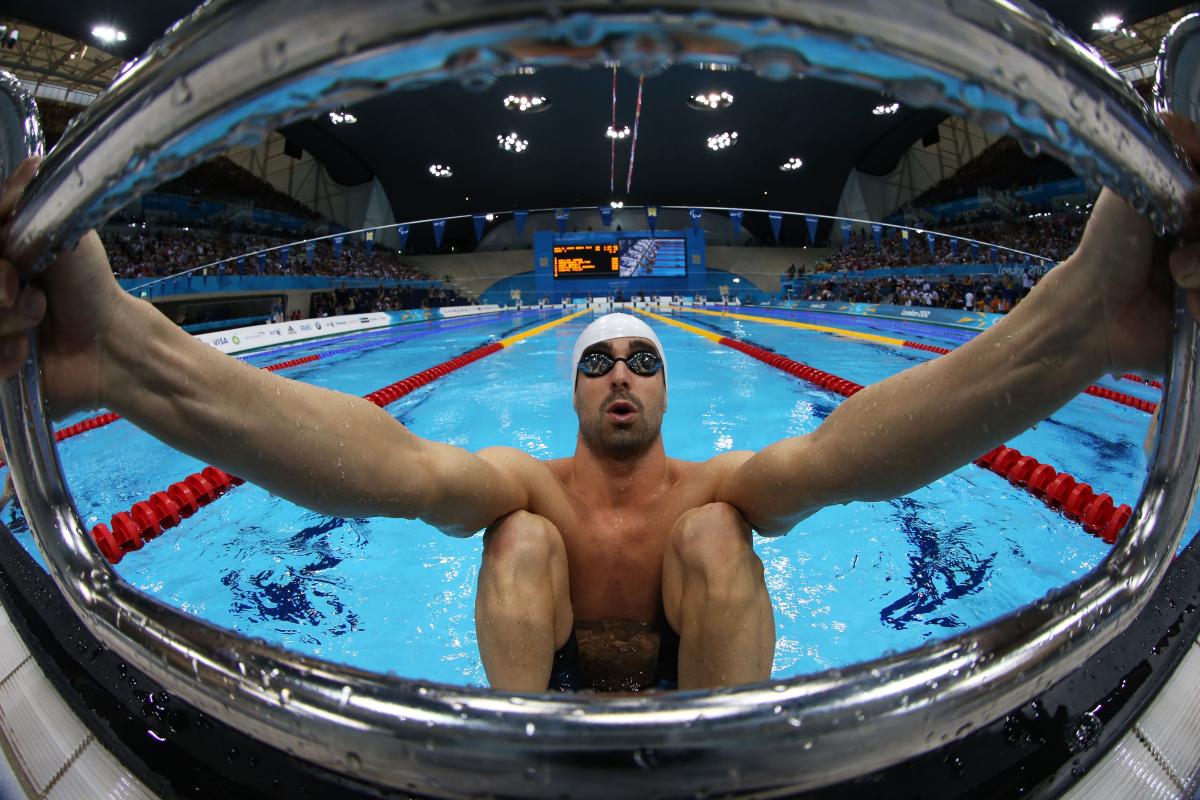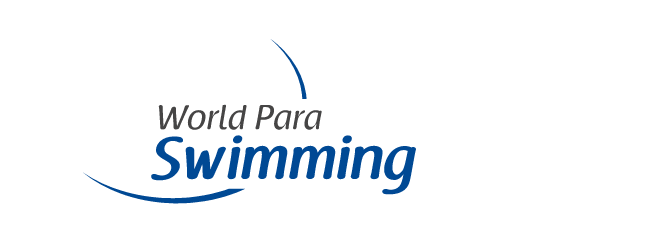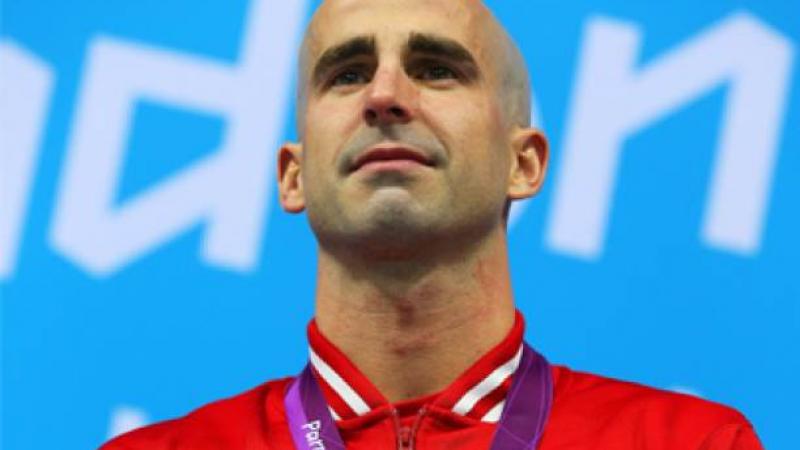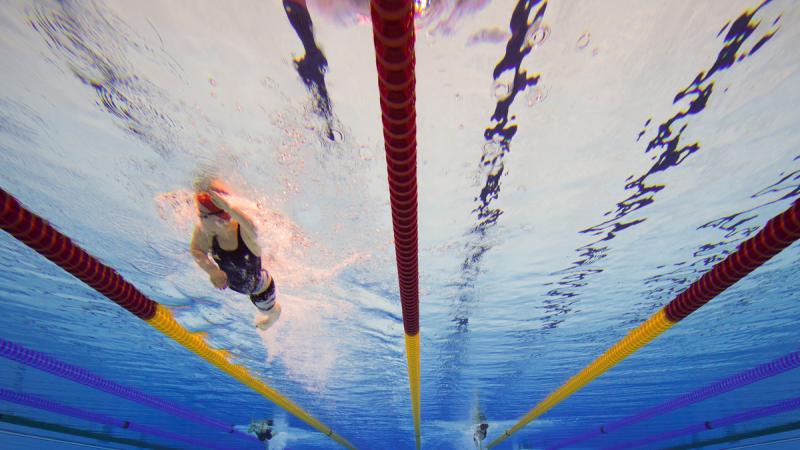Cams Ams Swimming Champs set for Toronto this weekend
The pool that will stage August’s Parapan American Games will play host to some of the world’s best para-swimmers. 20 Mar 2015
Canada's Benoit Huot gets set to race the men's 100m backstroke S10 at the London 2012 Paralympic Games.
Around 200 swimmers from 11 countries will be in action this weekend (20-22 March) in Toronto, Canada, as the Can Ams Para-Swimming Championships take place in the pool that will stage August’s Parapan American Games.
Amongst the swimmers set to take part at the spectacular CIBC Pan Am / Parapan Am Aquatics Centre and Field House are a number of Paralympic and world champions. This includes the US duo of Jessica Long and Brad Snyder and home favourite Benoit Huot.
Preliminary heats start each day at 09:30 ET, with finals at 18:00 ET. All sessions will be webcast live. For more information, visit www.swimming.ca
Swimming Canada is using the event to select teams for this summer’s two major international competitions – July’s IPC Swimming World Championships in Glasgow, Great Britain, and August’s Parapan American Games in Toronto – which take place within weeks of each other. A group of up to 26 athletes will be selected for Glasgow, and they will be joined by up to a further 15 swimmers for the Parapans.
“I have never done two major events in such a short period of time,” said Tess Routliffe, 16, a silver medallist in the 100m breaststroke S7 at last year’s Pan Pacific Para-swimming Championships in California, USA.
“That was the biggest meet I had done then. It was one meet and I was finished. It’s going to be a lot different this summer going from worlds to Pan Ams. It’s going to be new. I will have to see what happens.”
Morgan Bird, 22, has an idea what to expect. Last summer she was one of three Canadian swimmers to compete at the Glasgow 2014 Commonwealth Games, where she just missed the podium in the 100m freestyle S8, but went on to win a silver and a bronze medal at the Para Pan Pacs.
“You just have to get in the right mind-set for it, just think positive,” said Bird.
“Once one is done don’t think of it as you are done. You have to keep going. You still have to perform well at the next one.”
To help prepare them for the busy summer many of Canada’s swimmers recently attended a training camp.
Craig McCord, the para-swimming national coach since 2004, said the camp combined both athletes targeted for the podium at the Rio 2016 Paralympics plus a group earmarked for the Tokyo 2020 Games.
“This is one of the things we tried to do is to get these guys a boost going into the trials situation and help them progress towards the podiums.
“It’s a big factor as we lead into the trials and then as we go into a very busy summer.”
The goal of the camp was to work on fitness and technique.
“Everything thing is a lot of repetition, repetition, repetition,” said McCord.
“One of the big things we talk about as a technical staff is reliability of performance. How many times can you do the same thing over and over again at the same level or better. Anytime you are doing a preparation it should be the exact same preparation that you are going to do in the end.”
McCord said the training done at the camp is like laying a solid foundation prior to building a house.
“It all sort of piles up and builds on one another,” he said. “You are constantly building a wall, putting a new layer of bricks on it, making the wall stronger.”
The intensity of the camp can create challenges for some athletes. For Bird, who was born with cerebral palsy which affects the left side of her body, dealing with fatigue is a factor.
“If I get tired it affects it more,” she said. “I drag my foot more.
“I have learned how to adjust my workouts so that doesn’t happen. It’s happened before where I dig myself a hole. If I work too much and too hard in a week, I find I’m really exhausted by the end.”
Bird has worked with her coaches to find a schedule that suits her needs.
“If that means taking a practice off they are very lenient,” she said. “If I come to practice looking more tired than usual, they work with me to figure out what needs to get done, what’s appropriate and what’s not during workouts.”
McCord said para-swimmers who are amputees or missing a limb train basically the same as able-bodied athletes. Athletes like Bird, who deal with neurological conditions, need special attention.
“The more you train Morgan, the more compromised her electrical system gets,” said McCord. “The electrical system takes longer to recharge. It takes longer to recharge than the muscles do.
“We have to start the process of preparing Morgan probably seven to 10 days before we start resting someone who is missing an arm or a leg because we have to let the electrical system recharge.”
Bird is one of seven women pre-selected to compete at the World Championships. That has not dampened her desire to perform well at the Can Ams.
“It’s always been on my mind,” she said. “It’s never going to go away.
“I’m always thinking about what I can do in order to be at my best in trials. It is very important to me to do well there and making Canada proud, to keep my spot on the team. That is the most important thing for me now.”
July’s World championships will attract 650 swimmers from over 50 countries. The Parapan Am Games will feature around 1,600 athletes from 28 countries competing in 15 sports. All sports will be qualifiers for the Rio 2016 Paralympic Games.
Tickets for August’s Parapan American Games go on-sale on Monday 23 March.

 Facebook
Facebook
 Instagram
Instagram
 Twitter
Twitter
 Youtube
Youtube







